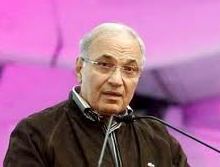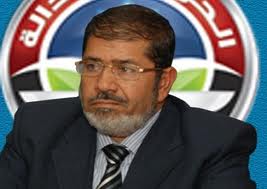 Egypt’s two most polarizing presidential candidates appeared headed for a runoff election next month that will decide whether the nation will be ruled by an ascendant political Islam or return to the secularist spirit that defined Hosni Mubarak’s toppled police state.
Egypt’s two most polarizing presidential candidates appeared headed for a runoff election next month that will decide whether the nation will be ruled by an ascendant political Islam or return to the secularist spirit that defined Hosni Mubarak’s toppled police state.
Official results in Egypt’s first free presidential election are expected to be released in coming days. But independent vote counts Friday indicated that Muslim Brotherhood candidate Mohamed Morsi would battle Ahmed Shafik, the last prime minister to serve Mubarak, in a June contest certain to enthrall the entire Middle East.
The stark matchup makes it clear that despite a year of upheaval, the pillars of the past remain strong — and they are colliding over the future of the country. Morsi represents the Islamist ideals of the Brotherhood, which for decades was the most potent opposition to the old regime. Shafik is the unabashed embodiment of the Mubarak era, an irascible former fighter pilot who bragged during the campaign of shooting down Israeli warplanes in the 1973 war.
Egyptian media reported that Morsi led the first round of voting with 26% of the vote, followed by Shafik with 23%. The headline on the Ahram Online website read, “Morsi, Shafik to face off” in next round.
The result was a setback for the young activists, largely liberal and secular, who ignited last year’s uprising that overthrew Mubarak. They failed to articulate a galvanizing vision for a country yearning for new leadership, leaving familiar ideologies to take on new resonance as Egyptians encountered military rule while common political ground diminished.
“I think we are on the verge of a new era. We trusted God, we trusted in the people, we trusted in our party,” said Essam Erian, a leading voice in the Brotherhood.
 The surprises were the disappointing showings of onetime front-runners Abdel Moneim Aboul Fotouh, a liberal Islamist who finished fourth with nearly 20% of the vote, and Amr Moussa, a former foreign minister and the savviest politician in the race, who came in fifth. The other significant turn was the unanticipated third-place finish for dark horse Hamdeen Sabahi, a socialist nationalist regarded by the cultural elite as the strongest alternative to Islamist and Mubarak remnants.
The surprises were the disappointing showings of onetime front-runners Abdel Moneim Aboul Fotouh, a liberal Islamist who finished fourth with nearly 20% of the vote, and Amr Moussa, a former foreign minister and the savviest politician in the race, who came in fifth. The other significant turn was the unanticipated third-place finish for dark horse Hamdeen Sabahi, a socialist nationalist regarded by the cultural elite as the strongest alternative to Islamist and Mubarak remnants.
By late Friday evening, Sabahi had won large parts of Cairo. But even though he was estimated to have won more than 20% of the vote, that apparently wasn’t enough to close the margin on Shafik. Voter turnout was considered low at between 40% and 50%.
A Morsi win in the June 16-17 runoff would shape the contours of a political Islam evolving from the uprisings that ousted autocrats across the Middle East and North Africa last year. The Brotherhood has been blamed for dogmatism and a lack of inclusion, but its leaders insist they are committed to civil liberties and protections for minorities, including Coptic Christians.
Shafik’s law-and-order campaign portrayed Islamists as a threat to freedom and promised to end months of demonstrations. He appealed to millions of Egyptians seeking stability amid economic turmoil and rising crime. A Shafik victory, however, would probably lead to renewed protests in Tahrir Square and further incite the country’s combustible politics.
Shafik left little doubt about his disdain for demonstrations and dissent: “The revolution has ended,” said his spokesman, Ahmed Sarhan.
The outcome indicated that polls did not accurately reflect the political currents in a nation where about 40% of voters remained undecided until the last minute. The two days of voting this week — and the fervor around Friday’s vote count — were a testament to the fluidity of the drama that mesmerized the country. Thirteen candidates ran in a burst of political freedom that was once unthinkable here.
Activists and young revolutionaries worried that Egypt is likely to endure years of civil rights being at risk — either through a new constitution anchored in Islamic law or by the heavy hand of Shafik, a retired air force general who was prime minister during the bloody crackdown on the protests that eventually toppled Mubarak.
“The results are depressing,” said Tarek Khouli, head of the April 6 democratic movement, which has helped lead antigovernment protests. “Many revolutionaries are thinking of boycotting the runoff…. We don’t accept either man as our president.”
This is the “worst-case scenario,” said Ahmed Khairy, spokesman for the liberal Free Egyptians Party. He called Shafik a “military fascist” and Morsi an “Islamic fascist.”
It was impossible to say whom supporters of Aboul Fotouh and Sabahi would gravitate to in the runoff. The phrase “lesser of two evils” was on Egyptian lips throughout the night and Twitter posts were alight with rage and bewilderment. “Does our country need a new president or new people,” read one.
Morsi’s surge in the final days of the campaign spoke to the Brotherhood’s prodigious organizational machine, which overcame concerns that Islamists, who control parliament, would dominate the government. Though many Egyptians were angry when the Brotherhood broke a pledge not to field a candidate, the world’s premier Islamist group was brash in predicting it would rally voters behind the uncharismatic Morsi.
An engineer who received his doctorate from USC, Morsi was often referred to as the “spare tire” because he was the Brotherhood’s second choice after Khairat Shater was disqualified. Morsi struggled at campaign stops and his comments were increasingly tailored to stir conservative Islamists, who account for hundreds of thousands, if not millions, of votes.
“I’m not surprised,” said Heba Mohamed Kamal, a Brotherhood member. “We never doubted our ability nor our popularity in the streets…. People understand how much the Brotherhood sacrificed for the country for more than 80 years.”
No matter who is elected, the power of the president will be decided by the ruling military. The drafting of a new constitution has been delayed and the generals have indicated they will amend the existing document to define the president’s authority and protect the army’s extensive military and business interests.
Such moves would probably draw limited criticism from Shafik, a Mubarak loyalist with close ties to the army brass. But a Morsi presidency would set up a landmark struggle between the nation’s dominant forces, which have been maneuvering against one another since the 1952 coup that won Egypt’s independence from colonial rule.
The military has vowed to hand power to a civilian government by July. The skeptics are many.
LA Times

Leave a Reply
You must be logged in to post a comment.